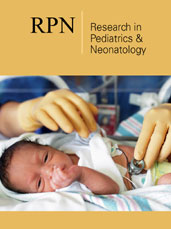- Submissions

Abstract
Research in Pediatrics & Neonatology
Neurodevelopmental Outcomes for Infants Treated with Whole Body Cooling After Hypoxic- Ischemic Encephalopathy with and without Clinical Seizures: Retrospective Chart Review
-
Open or Close Childres J* and Shaffer-Hudkins E
Department of Pediatrics, University of South Florida, USA
*Corresponding author: Jillian L Childres, Pediatric School Psychologist, Assistant Professor, University of South Florida, USA
Submission: January 05, 2018; Published: July 19, 2018

ISSN: 2576-9200Volume2 Issue3
Abstract
Introduction: This study described the developmental outcomes of infants who were diagnosed with Hypoxic-Ischemic Encephalopathy (HIE) after birth and were treated with whole body therapeutic hypothermia. Despite multiple studies on the efficiency and safety of therapeutic hypothermia for newborns with HIE little research is available specifically comparing developmental outcomes of infants with and without clinical seizure activity who have received this treatment.
Methods: We retrospectively analyzed cases of HIE in a Level 3 NICU who were treated with therapeutic hypothermia according to the hospital’s standard procedures. Demographic data and test scores were analyzed for the entire group of infants and scores were compared for the group of infants with versus without neonatal seizures.
Results: The study consisted of data collected from the medical records of 24 surviving infants. Demographic data were comparable for the seizures and no seizures groups for all variables analyzed except for maternal age (significantly younger mean age of mothers in the group of infants with seizures than without seizures). The group of infants without neonatal seizures had higher mean scores across all developmental domains than the group of infants with neonatal seizures; however, clinical significance in these differences were only achieved in two score areas.
Conclusion: Results of this study indicated that the majority of the infants had overall developmental scores that indicate Moderate to Severe Developmental Delays despite receiving the whole body cooling treatment. Specific comparisons between the group of infants with and without seizures who received this treatment indicated better developmental outcomes for infants without seizures than for those infants who had seizures, though statistically significant differences were found in one specific sub domain and in the overall Total Developmental Quotient. More of the infants in the no seizure group had developmental scores in the Average range than did infants in the seizures group.
Keywords: Neonatal, Hypoxic-Ischemic Encephalopathy (HIE); Therapeutic hypothermia; Seizures development; Outcomes
Abbreviations: HIE: Hypoxic-Ischemic Encephalopathy; NICU: Neonatal Intensive Care Unit; IDEA: Individuals with Disabilities Education Act; BDI-II: Battelle Developmental Inventory; EEG: Electroencephalogram; PA: Perinatal Asphyxia
 a Creative Commons Attribution 4.0 International License. Based on a work at www.crimsonpublishers.com.
Best viewed in
a Creative Commons Attribution 4.0 International License. Based on a work at www.crimsonpublishers.com.
Best viewed in 







.jpg)






























 Editorial Board Registrations
Editorial Board Registrations Submit your Article
Submit your Article Refer a Friend
Refer a Friend Advertise With Us
Advertise With Us
.jpg)






.jpg)














.bmp)
.jpg)
.png)
.jpg)










.jpg)






.png)

.png)



.png)






